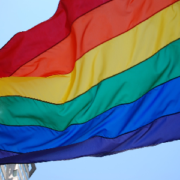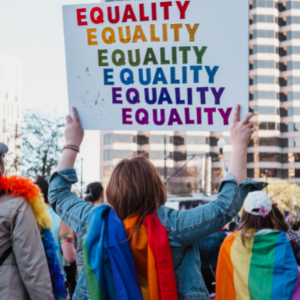Does Being LGBT Still Matter or Are We in a Post-Bias World at Work?
 Recently, I was asked to speak at The Conference Board’s Diversity and Inclusion conference in NY. My topic can be paraphrased into ‘why culture eats strategy for breakfast when it comes to diversity’ and most other things for that matter. In my session I was asked, “Do you still think that being LGBT matters since there has been considerable societal and workplace progress recently?”
Recently, I was asked to speak at The Conference Board’s Diversity and Inclusion conference in NY. My topic can be paraphrased into ‘why culture eats strategy for breakfast when it comes to diversity’ and most other things for that matter. In my session I was asked, “Do you still think that being LGBT matters since there has been considerable societal and workplace progress recently?”
My response was, “It depends on which firm you work for.” This holds true for a similar question regarding gender and essentially any social identity matter these days. Anecdotally, over the past seven years of theglasshammer’s existence, a small number of you have told me that it does not matter; that you are a woman at work and it has no bearing on your career. I see a small group of people echoing this sentiment when it comes to applying the same question to being LGBT at work. Conversely, most of you have told me or have acknowledged formally in print that, yes being a woman does matter and having other social identities, such as LGBT or being Multicultural, are factors that affect how people perceive you at work regardless of your talents. It even has affected how some of you see yourselves, famously coined as the imposter syndrome.
My first caveat is that you are entitled to any construct of belief that works for you, as personality and personal experiences are so often overlooked or discredited when they should not be. Ambition and access to the right relationships along with the natural desire often embedded into our personalities (conscious or otherwise) to assimilate to dominant group behaviors can trump a lot of adversity in any part of the world or in any workplace.
Many people enjoy hard work and find the climb exhilarating. There is something to be said for believing something and then growing your reality from that place. That is why we have theglasshammer and why books like Lean In exist; to give you every chance to think about networking, negotiation, and career advancement on your terms should you choose it. Further to that, if you buy into the concept that you control your destiny, you won’t see or perceive obstacles to be because of your social identity at work; this concept works for some people, myself included, until I studied Organizational Psychology. There is a certain personality who can make it anywhere, but the question sometimes becomes at what cost? I count myself in this category. If I was a flower I could grow happily on a rock. The downside of this strategy is that I would be completely ignoring the environmental forces around me that help other flowers grow with less energy and better soil on the meadow.
Stereotypes- Alive and Well
I want to share a shocking, previously unseen study with you that my good friend and associate Dr. Frank Golom conducted to prove that we don’t live in a post-bias world and that social identity matters.
The new study uses the famous and now forty-year-old “Think Manager, Think Male” trait research conducted and progressed by Virginia Schein. This new study by Dr. Golom et al extends the groups to include gay managers and lesbian managers in addition to (presumed) straight female and male manager categories.
Dr. Golom, whilst at Columbia University, surveyed almost 200 undergraduate and graduate students in the NY metro area. Eighty percent were women and a small percentage of all respondents were LGBT-identified. The results will astound you and make you think twice about any beliefs you may have around the next generation creating change just by virtue of being born as Gen Y.
Despite the survey responders being mostly women, the group that was elected as having the most leader-like traits was the straight male manager group. This group was ranked as most competent, productive, and emotionally stable amongst other attributes.
So perhaps these young, educated women might answer a direct question such as, “Do you want to be CEO?” as, “yes”, yet blatantly stated their group as a whole to be a less able group (remember this is a stereotype, actual competency levels were not measured as no individuals were presented here as subjects).
Furthermore, lesbians as a stereotyped group were rated as hostile and less competent than straight men yet had an edge over straight women ( as ranked by straight women, go figure?). Gay men really bore the brunt of the evils of stereotyping in this survey. They were assigned very low rankings on every trait that is considered to be leader-like, despite the slogans that people write on their Facebook such as, “It gets better”.
How can this be, I hear you ask? Well, you have all heard about unconscious bias and stereotyping but perhaps it is good to note that (mostly straight) women are guilty of it too. It is less discussed that (mostly white) women have a role in keeping the status quo in place due to their proximity to the current power structure, just as it is also a stereotype to think men don’t want to be involved and do something.
As a concept, it is known as “cognitive dissonance” or good old-fashioned denial that we could be the bad guy. I can best explain it with a taxi metaphor. You sometimes ride in a cab with no seatbelt, whilst you would not do this in your own car. Why? Because you separate the experience away from your normal logical rational set of rules and unconsciously decide that the damage that could result is something that happens to other people, not you. Diversity is something we say we want to endorse, yet our espoused values often are not behaviorally lived, even when it applies to us as a group of women.
Why Culture Matters?
Organizational culture is how work gets done in your firm, who gets to lead, who and what gets rewarded and conversely tolerated. This should be part of your own due diligence as beyond all the surveys and accolades, it is this information that will inform you about where is best to work for you. Man or woman, LGBT or not, and especially if you are in the group that hasn’t traditionally been authorized to hold power, you should be critically aware of your organization’s culture.
Societal progress is the wider backdrop for corporate progress to happen, with some companies and their leaders being rightly credited for standing up for equality for a while now. The reason that LGBT progress is moving faster than gender equality is that everyone is taking part in progressing equality (everyone being those who believe in it). Also, there are men involved and therefore it possibly becomes a higher status item with CEO’s taking part in a discussion recently on “Straight Ally CEO Dad and their Gay Sons” at Out on the Street.
This awareness and call to action by allies combined with the LGBT group members is transformative, especially when the allies are building the business case for the group just as the amazing Zach Wahls did in his request for equality for his parents.
We are only beginning to see this level of support for female gender equality by the historically powerful and authorized group, otherwise known as men. This is why theglasshammer is hosting our first ever “Engaging Men” event with Goldman Sachs this fall to invite men and women to join together and progress the gender conversation with senior champions, advocates, and supporters of women talking real strategies and understanding that everyone has a part to play in an inclusive culture.
If you wish to know more about our work at Evolved Employer, check out our 2012 LGBT research
By Nicki Gilmour, CEO and Founder of theglasshammer.com and Evolved Employer











Great article, Nikki. I love your phrase, “Why culture eats strategy for breakfast when it comes to diversity,” and totally agree.